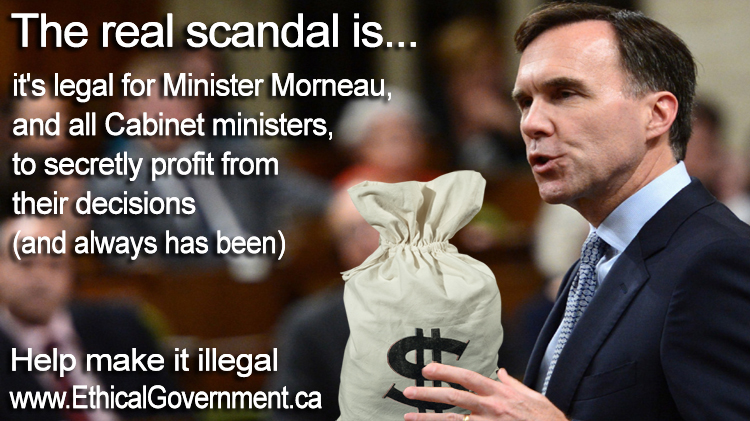Court says case raised “an important question” but screens are reasonably consistent with purpose of federal ethics law to prevent conflicts of interest
Court reaches flawed conclusions that a screen provides as much information as regular, detailed recusal disclosures – DWatch considers appeal to SCC
House Ethics Committee reviewing federal government ethics law soon – DWatch calls on Committee to ban use of screens, and to close loopholes that allow ministers to profit from their decisions (as Parker Commission recommended in 1987)
FOR IMMEDIATE RELEASE:
Tuesday, October 30, 2018
OTTAWA – Today, Democracy Watch released details of the Federal Court of Appeal (FCA) ruling it received last Friday in its case reviewing the Ethics Commissioner’s use of “screens” that allow Cabinet ministers and senior government officials to hide whether they are actually removing themselves from decision-making processes in which they have a conflict of interest.
Former Ethics Commissioner Mary Dawson decided to start to use screens years ago for the convenience of ministers and government officials covered by the Conflict of Interest Act (the “Act”). The screens are a public commitment that the minister or official makes to be removed by their assistant from any decision-making processes in which the minister or official has a conflict of interest, except decision-making processes that apply generally (99% of the decisions of ministers and officials apply generally).
Democracy Watch’s position was that, given that the Act requires ministers and officials to remove to themselves from any decision-making processes when they have a conflict of interest (section 21) and to issue a public declaration of the reasons why they removed themselves (subsection 25(1)) that is posted in the Public Registry (subsection 51(1)(a)), the Ethics Commissioner’s screens are “smokescreens” that hide whether ministers and officials are actually removing themselves from processes in which they have a conflict.
Democracy Watch argued before the court that the Ethics Commissioner could use screens, but not to replace the public declarations of recusals that are required by the Act.
The FCA’s ruling says the case raised “an important question” but screens are reasonably consistent with purpose of federal ethics law to prevent conflicts of interest (paras. 43-46).
However, the FCA reached the flawed conclusions:
- that a one-time, general screen statement by a minister or official provides as much information to the public as regular, detailed disclosures of each time they remove themselves from a meeting, discussion or vote (para. 48), and;
- that ministers and officials wouldn’t actually know about meetings, discussions and votes they are prevented from attending by their screen (para. 49).
As well, the FCA ignored the fact that when the Act was enacted in January 2007, the requirements to recuse and disclose the details of recusals were included in the Act, as recommended by the first Ethics Commissioner Bernard Shapiro.
As a result of these errors in the ruling, Democracy Watch is considering an appeal to Supreme Court of Canada.
“The court unfortunately ignored the public’s right to know the details of the actions of Cabinet ministers and top government officials and decided that it is fine to allow them to hide exactly if and when they are removing themselves from decision-making processes because of a conflict of interest,” said Duff Conacher, Co-founder of Democracy Watch and Adjunct Professor of Law and Politics at the University of Ottawa.
Because of the ruling, and many flaws and loopholes in the Conflict of Interest Act, Democracy Watch called on the House Ethics Committee when it reviews the Act soon to recommend many changes to strengthen rules, enforcement and penalties, including banning the use of blind trusts (as the Parker Commission recommended in 1987), and banning the use of screens because they hide whether ministers and officials actually recuse themselves.
As well, the biggest loophole in the Act must be closed because it allows Cabinet ministers and senior government officials to take part in decision-making processes even when they will profit from the decision, as long as the decision applies generally (the loophole is in the Act’s subsection 2(1) definition of “private interest”). About 99% of Cabinet minister and top official decisions apply generally, so the Act does not apply to 99% of the decisions ministers and top officials make.
Cabinet ministers and officials should be required to sell their shares and other investments, and to remove themselves from every decision-making process when they have even an appearance of a conflict of interest, as the Parker Commission also recommended in 1987.
“The House Committee must recommend that blind trusts and screens and other secret schemes currently allowed under the federal government ethics law be banned and, as the Parker Commission recommended in 1987, that ministers and officials sell their shares and other investments or be prohibited from participating in any way in any decision-making process that affects any of their investments, with all recusals declared publicly,” said Conacher.
– 30 –
FOR MORE INFORMATION, CONTACT:
Duff Conacher, Co-founder of Democracy Watch
Tel: (613) 241-5179 Cell: 416-546-3443
info@democracywatch.ca
Democracy Watch’s Government Ethics Campaign

